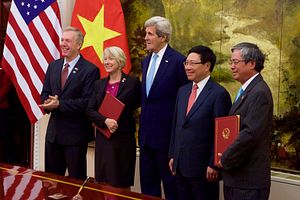Vietnam has started 2017 by continuing the flurry of diplomatic activity that it undertook during much of 2016. It is all part of Vietnam’s multidirectional foreign policy, which emphasizes cultivating as many diverse relationships as possible while integrating further into the international political economy.
From January 12-15, Nguyen Phu Trong paid his first visit to China since his re-election as Party secretary-general in January last year. While there, he witnessed the signing of 15 cooperative agreements. The two countries issued a joint communiqué in which they agreed to “manage their differences and safeguard peace in the South China Sea” while also noting the need to address the significant imbalance in trade. At the conclusion of the visit, Trong extended his invitation to Chinese President and Party Secretary Xi Jinping to visit Vietnam and attend the upcoming APEC summit being held in Vietnam.
While Trong was in China, John Kerry concluded his term as U.S. secretary of state by visiting Vietnam — a highly symbolic move. He re-visited the scene of his 1969 Silver Star Medal, where he met with a Viet Cong veteran who had known the Viet Cong soldier killed by Kerry. The outgoing secretary of state also met with Prime Minister Nguyen Xuan Phuc, who stated his optimism regarding the future of Vietnam-U.S. relations. He likewise extended an invitation to incoming President Donald Trump to visit Hanoi and attend the upcoming APEC summit. Although the success of the outgoing Obama administration’s “pivot to Asia” has been questioned, Vietnam has certainly been a focal point of that maneuver and Vietnam-U.S. relations have gone from strength to strength since the two countries signed a comprehensive partnership in 2013.
Finally, on January 16, Japanese Prime Minister Shinzo Abe paid a visit to Vietnam as part of his six day Asia-Pacific tour. During the visit, Abe promised Vietnam six new patrol boats and stated his strong support for Vietnam’s enhancement of its maritime law enforcement capability. Tokyo and Hanoi similarly signed numerous business agreements as the two countries deepened defensive, economic, and political cooperation.
This is not the first time Vietnam has strategically arranged its diplomatic visits. Back in October 2016, Nguyen Xuan Phuc’s visit to China was preceded by a visit to Hanoi from Indian Prime Minister Narendra Modi. The two countries upgraded their relationship to a comprehensive strategic partnership and New Delhi issued a $500 million line of credit for the purchase of defense equipment. Shortly after Phuc’s visit to China, Philippine President Rodrigo Duterte paid a visit to Vietnam, where he and Vietnamese President Tran Dai Quang praised their strategic partnership put into place in November 2015 and reaffirmed the two countries’ efforts to promote peace and security in the South China Sea. Of course this was before Duterte’s now infamous Beijing speech on “separation” from the United States, which raised grave concerns in Hanoi.
Additionally, Vietnam sent an envoy to China shortly after the historic U.S.-ASEAN Sunnylands Summit in February 2016. While there, Xi Jinping reminded the envoy that China and Vietnam share a “common destiny” and that management of disputes, as well as deepening cooperation is paramount to their bilateral relations. Then after Obama’s historic visit to Hanoi in May 2016, Vietnamese Foreign Minister Pham Binh Minh met with his Chinese counterpart Wang Yi on the sidelines of the Special ASEAN-China Foreign Ministers Meeting. Minh addressed his concerns over recent escalations in the South China Sea and stated the need to re-balance economic relations. Yet he also re-affirmed Vietnam’s commitment to deepen cooperation with China.
In these strategic diplomatic visits, Vietnam is demonstrating the strategic diversity it has in its partnerships. Such outreach is designed to say: Yes, we are willing to deepen cooperation with you, but we have other strategic partners with whom we are also deepening cooperation. In fact, Vietnam has some form of strategic partnership in place not only with all five members of the UN Security Council but with 11 additional countries. Through this diversity, Vietnam is able to increase its autonomy and resist any external pressure that any one of these strategic partners may try to place on Vietnam.
These diplomatic efforts are in tandem with concrete measures Vietnam is putting into to place to ensure the protection of sovereignty and territorial integrity and hedge against an assertive China. A week prior to the flurry of diplomatic activity, India announced that it was considering selling surface-to-air missiles to Vietnam, a move widely anticipated to anger China. India has emerged as a key partner in defense cooperation, providing training for Vietnamese defense personnel. The two sides are also reportedly nearing agreement on the sale of BrahMos cruise missile to Vietnam.
In conjunction, Vietnam installed sophisticated, highly accurate “EXTRA” rocket artillery systems acquired from Israel on five bases in the Spratly Islands in August this year, placing them within range of China’s South China Sea runways and military installations. Furthermore, new images emerging from the Spratly Islands show that Vietnam has completed a runway in addition to constructing two additional hangers. Vietnam continues its quiet, yet sophisticated, modernization of its armed forces.
The ongoing dispute in the South China Sea, the Trump presidency in the United States, and the Philippines’ reorientation toward China may present a host of uncertainties for Vietnam. However, one thing is certain — Vietnam will continue on its multidirectional path, ensuring it maintains a diverse array of partners, while continuing its modernization of its armed forces as a hedging strategy.
Nicholas Chapman is a PhD candidate at the International University of Japan specializing in Vietnam’s foreign policy, domestic politics, and civil society. He can be followed on Twitter @nchapman222

































